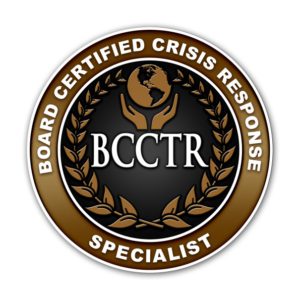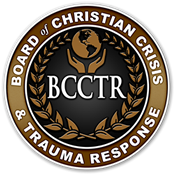
Everyone who applies for a credential with the BCCTR must specify the level of credentialing he/she is seeking. Currently, the BCCTR offers four national credentials in Christian Crisis and Trauma Response, which are the BCFR (Board Certified First Responder), the BCCRS (Board Certified Crisis Response Specialist), the BCCRC (Board Certified Crisis Response Chaplain), the BCCRT (Board Certified Crisis Response Specialist). Individuals, who meet the requirements for any given credential, may also be eligible to receive more than one designation and can request consideration when submitting the application packet.
Board of Christian Crisis and Trauma Response Credentials
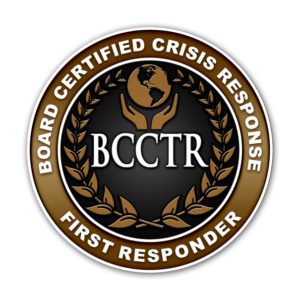
BCFR – Board Certified First Responder
Basic Requirements:
- Identify and practice as a Christian Crisis and Trauma Responder. This refers to practicing crisis and trauma responders who incorporate biblical principles and intervention skills with appropriate theory, knowledge, and professional practice.
- Completion of a minimum of 24 educational hours/CEs of specialized crisis response training related to the incorporation of biblical principles and intervention skills with appropriate theory, knowledge, and professional practice. Must include basic/foundational crisis response concepts and content.
- Demonstrate CISM-related experience: a minimum of 25 hours of which at least 10 hours must consist of formal experience (e.g., actual debriefing, defusing, crisis intervention, etc.).
- Once the credential is awarded, maintain at least 15 CEs every two years related to the incorporation of biblical principles and crisis response skills with appropriate theory, knowledge, and practice.
Additional Supportive Documentation Required:
- Contact hour and educational documentation that demonstrates the education/training incorporated biblical principles and crisis response skills with appropriate theory, knowledge, and practice.
BCCRS – Board Certified Crisis Response Specialist
Basic Requirements:
- Identify and practice as a Christian Crisis and Trauma Responder. This refers to practicing crisis and trauma responders who incorporate biblical principles and intervention skills with appropriate theory, knowledge, and professional practice.
- Completion of a minimum of 60 educational hours/CEs of specialized crisis response training related to the incorporation of biblical principles and intervention skills with appropriate theory, knowledge, and professional practice. Must include basic/foundational crisis response concepts and content.
- Demonstrate CISM-related experience: a minimum of 50 hours of which at least 25 hours must consist of formal experience (e.g., actual debriefing, defusing, crisis intervention, etc.).
- Once the credential is awarded, maintain at least 15 CEs every two years related to the incorporation of biblical principles and crisis response skills with appropriate theory, knowledge, and practice.
Additional Supportive Documentation Required:
- Contact hour and educational documentation that demonstrates the education/training incorporated biblical principles and crisis response skills with appropriate theory, knowledge, and practice.
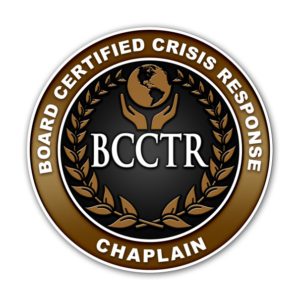
BCCRC – Board Certified Crisis Response Chaplain
Basic Requirements:
- Identify and practice as a Christian Crisis and Trauma Responder and primarily in a chaplain/pastoral role. This refers to practicing crisis and trauma responders who incorporate biblical principles and intervention skills with appropriate theory, knowledge, and professional practice.
- Ordination, religious licensure, and/or certification from a recognized entity – pastors and chaplains with state sanction, national certification, denominational recognition, and/or religious licensure.
- Completion of a minimum of 60 educational hours/CEs of specialized crisis response training related to the incorporation of biblical principles and intervention skills with appropriate theory, knowledge, and professional practice. Must include basic/foundational crisis response concepts and content.
- Demonstrate CISM-related experience: a minimum of 50 hours of which at least 25 hours must consist of formal experience (e.g., actual debriefing, defusing, crisis intervention, etc.).
- Once the credential is awarded, maintain at least 15 CEs every two years related to the incorporation of biblical principles and crisis response skills with appropriate theory, knowledge, and practice.
Additional Supportive Documentation Required:
- Copy of ordination, religious license, appropriate certification and/or credentials.
- Contact hour and educational documentation that demonstrates the education/training incorporated biblical principles and crisis response skills with appropriate theory, knowledge, and practice.
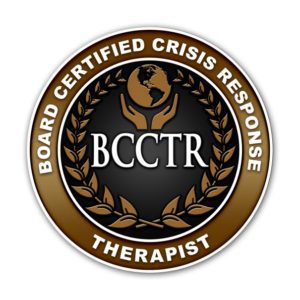
BCCRT – Board Certified Crisis Response Therapist
Basic Requirements:
- Identify and practice as a Christian Crisis and Trauma Responder and primarily in a mental health professional role. This refers to practicing crisis and trauma responders who incorporate biblical principles and intervention skills with appropriate theory, knowledge, and professional practice.
- An earned master’s or doctorate degree in counseling or a related mental health field from a regionally or nationally accredited college or university.
- Have a master’s or doctoral level license issued by one of the 50 states, territories, or Canadian provinces, as a fully independent mental health practitioner (not requiring any clinical supervision) – licensed psychologists, professional counselors, mental health counselors, marriage & family therapists, clinical social workers, clinical nurse specialists/practitioners, substance abuse providers, and psychiatrists.
- Completion of a minimum of 60 educational hours/CEs of specialized crisis response training related to the incorporation of biblical principles and intervention skills with appropriate theory, knowledge, and professional practice. Must include basic/foundational crisis response concepts and content.
- Demonstrate CISM-related experience: a minimum of 50 hours of which at least 25 hours must consist of formal experience (e.g., actual debriefing, defusing, crisis intervention, etc.).
- Once the credential is awarded, maintain at least 15 CEs every two years related to the incorporation of biblical principles and crisis response skills with appropriate theory, knowledge, and practice.
Additional Supportive Documentation Required:
- Copy of earned degree(s).
- Contact hour and educational documentation that demonstrates the education/training incorporated biblical principles and crisis response skills with appropriate theory, knowledge, and practice.

